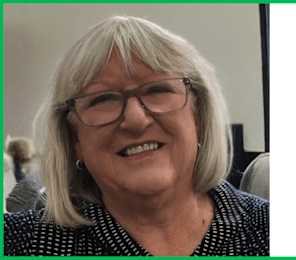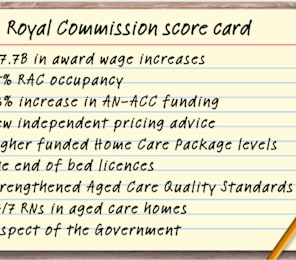Commissioner Lynelle Briggs has queried if the sector has the will to drive to the “significant” recommendations to come out of the Royal Commission as aged care and home care CEOs pointed to the need to increase the leadership capacity of the sector.
For over an hour, Senior Counsel Assisting Peter Rozen QC had questioned the panel of CEOs: SA-based Not For Profit Resthaven’s Richard Hearn (pictured further below); family-owned home care provider KinCare’s Jason Howie (pictured above left), Victoria-based community-run Shepparton Villages’ Kerri Rivett (pictured below) and Victorian-based Not For Profit Benetas’ Sandra Hills (pictured above right) – around several topics including choosing board members, staffing engagement, and staff attraction and retention – and the importance of culture was underscored immediately.
Mr Rozen had kicked off with the question that has been at the heart of the Royal Commission since its first hearings:
“Operating within essentially the same funding system, how is it that some organisations can do such a great job in aged care whereas others seem to be really struggling providing substandard care and are poorly staffed?” he asked the group.
All four CEOs pointed to the importance of the board and executive leading from the top.
“It’s not just about funding,” Ms Hills stated. “We all get the same amount of funding. I do think there are issues around size. Large organisations have greater capacity but they don’t always do a good job, as we have heard. So – and I do think we need to also focus on the staff that provide support so the corporate services staff. It’s not just the direct care operational staff; it’s also what goes on in the back of office.”
Ms Rivett also pointed to size – and the need for senior management to be ‘on the ground’ – as an issue.
“There is a certain size where you’re able to attract those higher skills as well. And the smaller you are – you will actually find the CEOs and the Executive Directors of care services getting in amongst the business as well, because you just don’t have the size to be able to employ multiple people to do the same amount of work that you might see in a big organisation.”
Mr Howie said from a home care perspective, they find it is no longer enough to just be delivering a good service and engaging well with their staff.
“We also need them to be brand ambassadors and customer service representatives, and a whole range of other skill sets that they’ve not needed before,” he said. “And there is this constant tension between the flexibility that our customers are requesting from us and the stability that our employees are requesting in order to build solid, consistent rosters and consistency of income.”
Mr Hearn said Resthaven had already been noting comments from the banking Royal Commission and the importance of understanding the sector when recruiting new directors.
“We have found that to be quite important in terms of the board being challenged,” he added.
This led the Senior Counsel to a new question and a now-familiar theme at the Royal Commission: penalties for board directors and management.
“Without intending to put the fear of God into you about that – is there a place for something like that in aged care? It seems a big gap in the regulatory frame-work,” he remarked.
Perhaps not surprisingly, there was a distinct lack of enthusiasm for this idea. Mr Hearn maintained providers are already covered by occupational health and safety obligations.
“I believe the actual penalty or sanctions approach that’s available to the Department has significant impact on Board members in its responsibility,” he said. “So, I err on the side of what will attract people to aged care, and I think that would raise a concern for some individuals who, we think, could make very positive contributions.
Commissioner Tony Pagone wasn’t satisfied with this answer however, addressing the group.
“What steps do you take to monitor whether the Board members are actually doing what they should be doing?” he asked. “Often for Board members, it’s a matter of preparing for the quarterly meeting, looking as though they’re awake during the length of the meeting and hoping that nothing comes up, that hasn’t been dealt with by the CEO. What can you do to make sure that Board members are doing what they are supposed to be doing? You all want to have a go, I can see,” he commented as they all indicated they wanted to answer.
Ms Hills, Mr Hearn and Ms Rivett said they regularly survey their board directors, require them to do self-evaluations and provide feedback.
Both the Commissioners and Senior Counsel were obviously looking for solutions to some of the major issues around staffing – but sometimes they were the ones putting them forward.
Speaking to Mr Hearn, Mr Rozen asked:
“Given that we know that we need to expand the workforce significantly over the next 20 or 30 years – how do we do that? How do we get more people to want to work in aged-care, to jump out of bed and say ‘I’m off to work at Resthaven’, the way we do with the Royal Commission; really want to get out of bed and get to work? How do we do that as an industry? How do you do that as an industry?”
The Resthaven CEO put forward one idea – which we have discussed in The Daily COMMISSION: the need for a national campaign to raise awareness of ageing.
“I think in relation to that – maybe it’s a COAG-type approach, where someone’s really got to come – the – all Governments got to come together and move forward on, I think, a targeted view on the positive elements of ageing and the nature of ageing in society and embed that across all parts of society,” he said.
Ms Rivett also put forward a traineeship model to work with VET providers to train young people to work in the sector which Shepparton Villages have trialled but need more funding to put into action.
But it was Mr Rozen who had the ‘lightbulb moment’.
“Would a Commonwealth Government fund that was available to support appropriately evaluated proposals like that be something the industry would welcome?” he asked.
“Like a HR innovation fund would – yes, I think that would be extremely beneficial to the industry, yes,” Ms Rivett agreed.
The Senior Counsel also asked the group straight out what recommendations they want to see come out of the Royal Commission – calling it their ‘once in a lifetime opportunity’.
The ideas put forward were not necessarily ‘new thinking’ however.
A number had already been raised before the Commission including implementation of the 14 strategic actions from the Aged Care Workforce Taskforce Strategy report; the need for aged care to be a single portfolio with a place in Cabinet; a strategy for staffing rural and remote areas; and clear career pathways for Certificate III workers.
The KinCare CEO did have a vision for the immediate future – to ‘clear the air’ for providers.
“What we really need is an environment to be created where we have got enough clear air in front of us to be able to address the challenges that we have got as a business,” he said. “Now, just to give you some context around that, if you consider what we are having to face as an organisation at the moment; we are in the middle of a major transformation program from a business to government to business to consumer model with all the investment that that requires.”
“We are in the middle of a Royal Commission,” he went on. “We are in the middle of an upgrade to the Quality Standards across the industry. And now just in the last few days we have got changes being proposed to payment arrangements which are going to have the effect of stripping four to six months’ worth of funding out of the industry over the course of the next two years. So, in effect we are going to have to operate for 20-odd months, sorry, for 24 months on about 18 to 20 months’ worth of funding.”
“So, having some transparency and some predictability around the funding, the cash flow that we are receiving, information being published around where packages are being released and how we’re going to be able to – so that we can plan our workforce skills and so on around demand management. We don’t have a transparent marketplace at the moment. You know, a precondition of a marketplace is fully informed buyers and sellers, and we don’t have enough information in the marketplace at this point to be able to say that we’ve got a genuinely functioning marketplace. So, creating the conditions for the home care industry to really thrive, I think, is probably the major role of the government.”
While the Senior Counsel reached the end of his questioning, it was evident Commissioner Lynelle Briggs (pictured above right) was still searching for more guidance on how the Commissioners will be able to ‘turn the system upside down’ – and ensure those reforms actually happen.
“I’m very conscious that a lot of success depends on leadership both at the higher level but also at the local level,” she stated. “But my question is not so much about that. It’s about the broader issue because I’ve seen the fragility of leadership. If a good leader goes, the thing falls apart. So, the real question is – you would expect that when we write our final report we will be making quite significant changes and you’ve expressed concern about that … how do you embed change [within an organisation], both introduce, embed and be guaranteed it’s going to stick?”
Mr Howie was the first to take a crack.
“The – it does, it requires a really deliberate and strategic approach to whatever change you put in place in an organisation,” he stated. “There are very well-established change management frameworks which you would expect professional organisations and professional leadership teams to be accessing. There’s no question that the leadership – or leadership of this nature starts with the board and the governance structures. The selection of the CEO makes a huge difference to an organisation. And at every layer then throughout the organisation, the quality of leadership that we have in place makes a big difference to the results that we get.”
Ms Hills also pushed for the leadership capacity of the industry need to be increased.
“Looking at succession planning in that area is crucial because if you don’t have the people with the skills, you are going to get nowhere,” she said.
The Benetas CEO also pointed to the need to look outside the sector and internationally.
“There’s some fantastic opportunities there because we need trailblazers and people who are going to be those out there who are the sort of expert – subject matter experts,” she added.
This led the Commissioner to another question – does the sector has the drive to make this happen?
“Is there the energy and excitement and will to make these kind of changes, and is it apparent from where you sit that people are looking at the evidence from the Royal Commission and saying, ‘What does that mean for us and how do we improve this industry as a whole’?
But if she was hoping for a positive response, the Commissioner would have been disappointed.
Ms Rivett maintained she still has passion along with 80% of her staff (what about the other 20%?), but both Mr Hearn and Ms Hills agreed that at least some of the leadership is tired.
“Maybe the Commission is picking up on that to some degree, and I just do believe it’s very important for the Royal Commission to identify that vision and make that leadership statement,” Mr Hearn said.
Ms Hills added that there is huge commitment in the industry.
“I think that perhaps there are some – well, there are some providers that shouldn’t be in the industry and perhaps will choose one way or the other to move on because hopefully your recommendations will be such that it will be very clear that this is the way going forward and if you are not on the boat, there’s the sea,” she said.
Commissioner Tony Pagone (pictured above left) acknowledged the message that the Government has a role to play in these changes – but the expression on Commissioner Briggs’ face still seemed to indicate it was an opportunity that had been missed.










